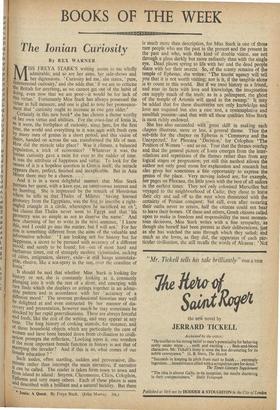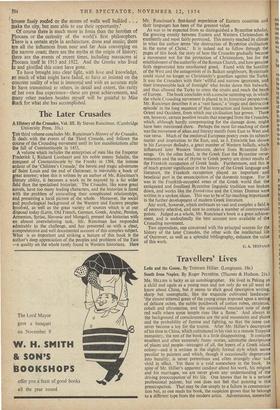BOOKS OF THE WEEK
The Ionian Curiosity
By REX WARNER ISS FREYA STARK'S writing seems to me wholly admirable; and so are her aims, her side-shows and her digressions. Curiosity led me.' she states, pure, disinterested curiosity,' and she adds that if we are to criticise the British for anything, as we cannot get out of the habit of doing, even now that we are poor—it would be for lack of this virtue.' Fortunately Miss Stark has always possessed the virtue in full measure, and one is glad to note her pronounce- ment that curiosity ought to increase as one gets older.' Certainly in this new book* she has chosen a theme worthy of her own virtue and abilities. For the coast-line of Ionia is, aS it were, the birthplace of curiosity, since here, for the first „time. the world and everything in it was seen with fresh eyes °Y many men of genius in a short period, and this vision of theirs, handed on across the sea, transformed the life of men. How did the miracle take place? Was it climate, a balanced Population, a trick of economics? Whatever it was, the Ionian curiosity gave a twist for ever to the rudder of time. rt was the attribute of happiness and virtue. To look for the causes of it is a hopeless question in Greeze itself; the miracle aPpears there, perfect, finished and inexplicable. But in Asia Minor there may be a chance. . . And it is in a most delightful manner . that Miss Stark Pursues her quest, with a keen eye, an omnivorous interest and no humbug. She is impressed by the remark of Herodotus Where he tells us that. Thales of Miletus having learned geometry from the Egyptians, was the first to inscribe a right- angled triangle in a circle, whereupon he sacrificed an ox '; but claims that Thales never went to Egypt and that his geomet....ty was so simple as not to deserve the name.' And how charming of her to write in the next sentence, I know this, and I could go into the matter, but I will not.' For her ,..ailT1 is something different from the aims of the valuable and Formative scholar.• I am looking not for history but for naPpiness, a secret to be pursued with accuracy of a different mood; and surely to be found; for—out of most hard and barbarous times, out of strangely modern vicissitudes, sacking Of cities, emigration, slavery, exile—it still hangs unmistake- able, elusive, like a sea-spray in the sun, over the coastline of It should be said that whether Miss Stark is looking for history or not, she is constantly looking at it, constantly Plunging into it with the zest of a diver, and emerging with rare finds which she displays or strings together in an admir- able pattern and in accordance with her accuracy of a different mood.' The severest professional historian may well be delighted at and even instructed by her manner of dis- covery and presentation, however much he may sometimes be Shocked by her rapid generalisations. These are always forceful and fresh, like the rest of the writing, and may appear at any time. The long history of cooking utensils, for instance, and el those household objects which are particularly the care of Women and have been handed down from civilisation to civili- sation prompts the reflection, Looking upon it, one wonders if the most important female function in history is not that of .marrying the invader? And if this is so, what comes of our female education ? ' Such asides, often startling, sudden and provocative, illu- ptinate rather than interrupt the main narrative, if narrative It can he called. The reader is taken from town to town and .t.!orn island to island : Smyrna, Clazomenae, Chios, Colophon, tPhestis and very many others. Each of these places is seen and described with a brilliant and a natural lucidity. But there
* Ionia: A Quest. By Freya Stark. (John Murray. 30s.)
is much more than description, for Miss Stark is one of those rare people who see the past in the present and the present in the past and who, with this kind of double vision, sea not through a glass darkly but more radiantly than with the single eye. Dead places spring to life with her and the dead people share with her their secrets. So. of the scanty remains of the temple of Ephesus, she writes: 'The tourist agency will tell you that it is not worth visiting; nor is it, if the tangible alond is to count in this world. But if we treat history as a friend, and ease its facts with love and knowledge, the imagination can supply much of the truth; as in a palimpsest, the ghost of the temple of Artemis will stand in the swamp.' It may be added that for these discoveries not only knowledge and love are required but also a rare zest, a contemplative and unselfish passion—and that with all these qualities Miss Stark is most. richly endowed.
She has also succeeded with great skill in making each chapter illustrate, more or less, a general theme. Thus the sub-title for the chapter on Ephesus is 'Commerce and the Unexpected,' for Phocaea Decision,' for Colophon 'The Position of Women '--and so on. True that the theme's overlap and that the general picture of Ionia emerges from the inter- relations and repetitions of the themes rather than from any logical stages or progression; yet still this method allows the author not only good room for explanation and research but also gives her sometimes a fine opportunity to express the genius ot the place. Very moving indeed are, for example. her pages on Phocaea, the little town with the best of all sailors in the earliest times. They not only colonised Marseilles but voyaged to the neighbourhood of Cadiz; they chose to leave their city and sail off to the west when threatened with the certainty of Persian conquest; but still, even after swearing their oaths never to return, half the citizens could not bear to leave their homes. Of these and others, Greek citizens called upon to make in freedom and responsibility the most momen- tous decisions, Miss Stark writes with a fine sympathy, 1 as though she herself had been present at their deliberations, just as she has watched the seas through which they sailed; and much as she loves, as they did, the apparatus of each par- ticular civilisation, she still recalls the words of Alcaeus: Not bouses finely roofed or the stones of walls well builded . . . , make the city, but men able to use their opportunity.' 1 Of course there is much more in Ionia than the heroism of rhocaea or the curiosity of the world's first philosophers. There is a certain style in architecture, dress and music; there ere all the influences from near and far Asia converging on the narrow coast; there are the myths at the origin of history; 'E ere are the events of recent times, including massacres at hocaea itself in 1913 and 1922. And the Greeks who lived and glorified this coast have gone. To have brought into clear light, with love and knowledge, to much of what might have faded, to have so insisted on the concrete reality of what is immortal and with an accurate style to have transmitted to others, in detail and extent, therarity of her own fine experience—these are great achievements, and tliany other readers besides myself will be grateful to Miss Stark for what she has accomplished.



































 Previous page
Previous page